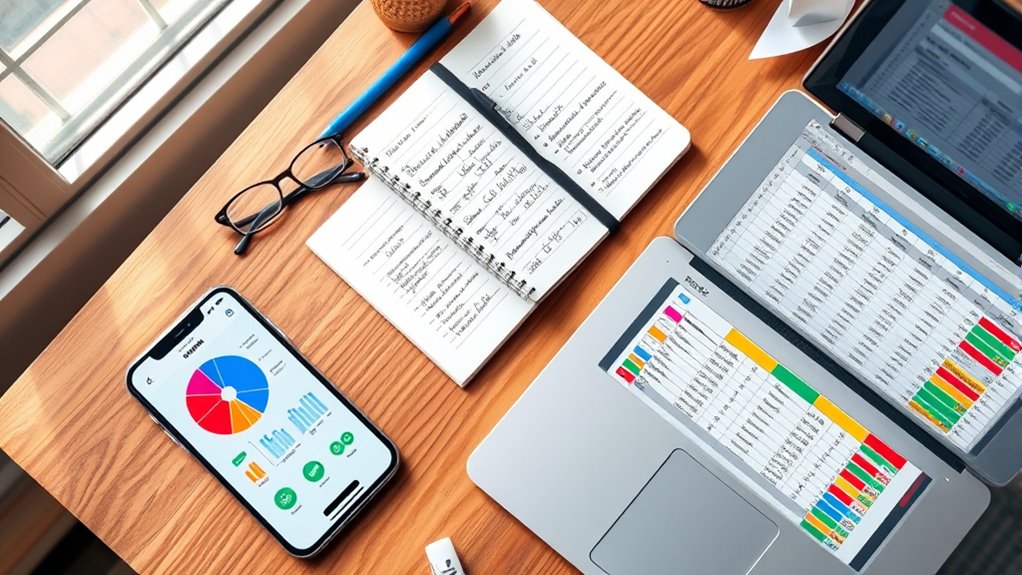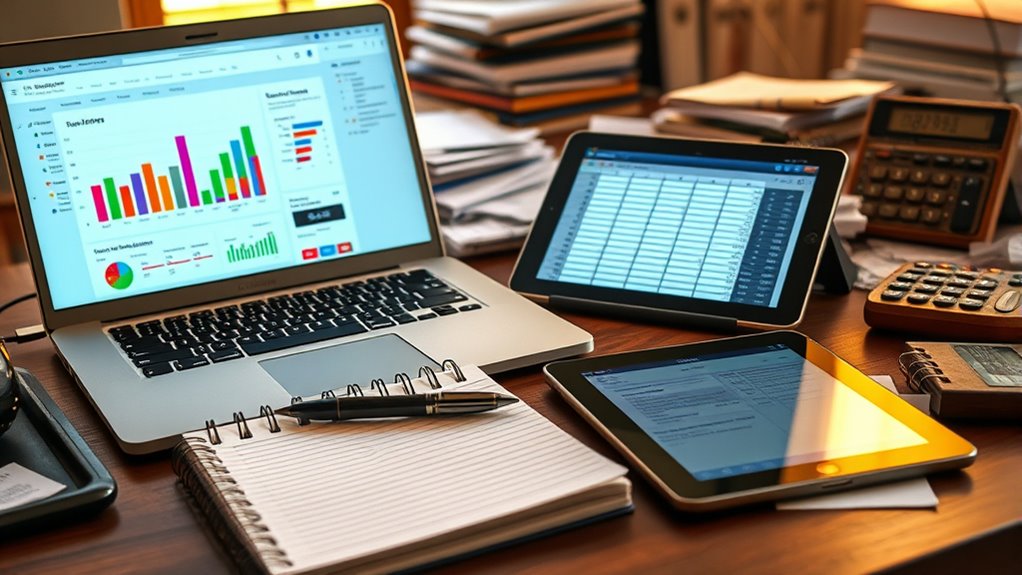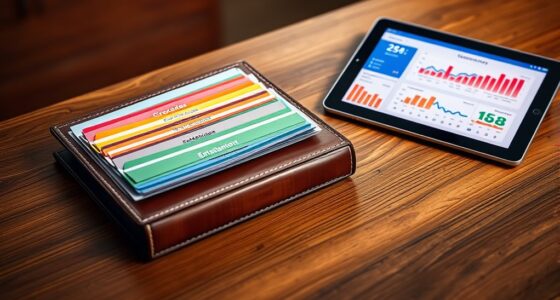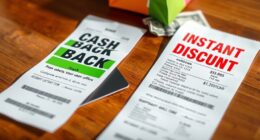Choosing the right budgeting tool depends on your preferences and tech comfort. Apps are great if you want convenience, real-time alerts, and easy access on the go. Spreadsheets offer more control and customization for those comfortable with software, while paper budgets are simple and tangible, perfect if you prefer manual recording. Each has unique benefits—exploring further will help you pick the best fit for your financial goals.
Key Takeaways
- Apps offer convenience, automation, and real-time updates, ideal for on-the-go budgeting.
- Spreadsheets provide customization and detailed control through formulas and data visualization.
- Paper budgets are simple, tangible, and require no technology, suitable for basic tracking.
- Apps may include premium features and educational tools, while spreadsheets and paper budgets focus on control and simplicity.
- Choice depends on user preference, tech comfort, and desired level of detail and automation.

Managing your finances effectively requires the right budgeting tools, and with so many options available, choosing the best one can be overwhelming. Whether you’re just starting to build your financial literacy or trying to refine your spending habits, the right tool can make all the difference. Apps, spreadsheets, and paper budgets each have their strengths and drawbacks, so it’s essential to understand how they fit your needs.
Apps are popular because they’re convenient and user-friendly. They often come with features like automatic expense tracking, real-time alerts, and syncing across devices. If you prefer to manage your finances on the go, an app might be the best choice. Many apps also offer educational tips, helping you improve your financial literacy as you go. This can be especially valuable if you’re trying to understand your spending habits better or cut unnecessary expenses. But keep in mind, some apps require subscriptions or premium features for full access, and you need a smartphone or tablet to use them effectively.
Spreadsheets, on the other hand, offer a level of customization that apps can’t match. With a spreadsheet, you can tailor your budget to your specific financial situation, tracking income, expenses, debt payments, and savings exactly how you want. This flexibility makes spreadsheets ideal if you’re comfortable with formulas and want detailed control over your budget. They also serve as a great learning tool, helping you develop your financial literacy by giving you a clear picture of your financial picture. However, spreadsheets can be time-consuming to set up and maintain, and they require a basic understanding of spreadsheet software like Excel or Google Sheets.
Paper budgets are the simplest and most tangible option. Writing down your income and expenses can help you become more aware of your spending habits and reinforce discipline. Many people find that physically seeing their budget on paper helps them stay accountable. Paper budgeting also doesn’t require any technology, making it accessible for everyone. But, it’s less efficient for tracking ongoing expenses or making quick adjustments. Plus, it offers fewer opportunities for learning and analyzing your financial patterns compared to digital options.
Ultimately, the best budgeting tool depends on your lifestyle, comfort with technology, and financial goals. If you’re just starting and want to improve your financial literacy, a simple paper budget or an easy-to-use app might be best. If you prefer control and customization, spreadsheets can serve you well. Whichever you choose, consistency and awareness of your spending habits are key to gaining control over your finances.
Frequently Asked Questions
Which Budgeting Tool Is Best for Couples Managing Joint Finances?
You should choose a budgeting tool that simplifies joint account management and expense sharing methods. Apps often work best because they offer real-time updates, automatic tracking, and easy sharing with your partner. Spreadsheets provide customization, while paper methods may lack flexibility. For seamless collaboration, an app tailored for couples helps you stay organized, communicate effectively, and manage finances together without confusion or delays.
How Secure Are Digital Budgeting Apps With Sensitive Financial Data?
Digital budgeting apps are generally secure because they use data encryption to protect your sensitive financial information. Plus, reputable apps have strict privacy policies that limit data sharing and guarantee your details stay private. However, you should always verify the app’s security features and read their privacy policies carefully. By doing so, you can confidently manage your finances knowing your data remains protected against unauthorized access.
Can Spreadsheets Automatically Track and Categorize Expenses?
Yes, spreadsheets can automatically track and categorize expenses if you set up formulas and use features like data validation. With some customization, they enable real-time tracking, so you see updates instantly as you input data. Automatic categorization is possible through predefined rules or macros, helping you organize your finances efficiently. However, it requires manual setup and ongoing maintenance, unlike dedicated apps with built-in automation.
Are Paper Budgets More Effective for Financial Discipline?
Paper budgets can be more effective for your financial discipline because they force you into manual tracking, making every expense more tangible. Think of it as holding a mirror to your spending habits—visual organization helps you see your financial picture clearly. This tactile approach keeps you engaged and accountable, turning your budget into a daily ritual rather than just numbers on a screen. It’s discipline in its most raw form.
How Do Budgeting Tools Adapt to Changing Financial Goals?
You can adapt your budgeting tools to changing financial goals by choosing those that offer flexibility, like apps with customizable categories or spreadsheets with adjustable formulas. These adaptive budgeting methods let you easily update your budget as your goals evolve. This way, you stay on track and maintain financial goal flexibility, ensuring your budget grows with your needs rather than limiting you with rigid structures.
Conclusion
Choosing the right budgeting tool depends on your needs, but did you know that 80% of people who use digital apps report better financial awareness? Whether you prefer apps, spreadsheets, or paper, the key is consistency. Digital tools offer convenience, while paper gives a tactile feel. So, pick what suits your style and stay committed. Your financial health improves when you stick with it—no matter which method you choose.









